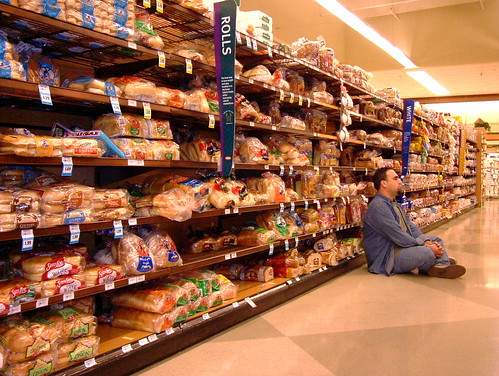
The Times Higher ran a piece on ceviche cooking edupunk Brian Lamb's keynote at the recent JISC OER event in London. Brian makes his usual good points, but it was some of the comments that were revealing.
In particular, one that states "We should also have 'open access' at Tesco: I should just be able to take from their shelves what I want without paying."
I've heard this a lot in various guises over the years. I can't believe I'm still hearing it. I know that you know this is a dumb argument, but please, can we just put it to bed once and for all.
Open access is not like stealing bread from Tesco for two VERY SIMPLE reasons:
i) If I take a loaf bread from Tesco then it is no longer there. If I read an online article it is still there for everyone else. We knew this back in 1998 when we talked about non-rivalrous goods. Can we stop using this misguided analogy now? Pleeeease?
>ii) You could make the argument that each download of pirated music equals a sale lost (although that is a flawed argument I think). So maybe the argument has some validity for products you want to sell (big maybe for me). But for journal articles it really has no validity - the whole point of research publications is that you want as many people to read it as possible. And we know that open access journals get more citations than closed ones. So closed access defeats the very objective you are trying to realise.
Let's put this one behind us now shall we? It's not as if digital content is new now is it?

Martin, of course you are right, digital resources are not physical resources and don't suffer the same constraints, and the majority of the comments on that article are unsubtle and ill-formed.
But I made this comment on twitter but I want to bring it up here too; by over-emphasizing the lack of cost to reproduce digital content and de-emphasizing the material conditions that surround the creation of ALL knowledge, we may be doing ourselves a disservice in the OER movement that leaves us constantly wondering how we convince people to share because we focus on the digital possibilities and not the material conditions that inhibit it. Not sure if I am making sense, and am certainly not wanting to give credibility to the kinds of comments I was seeing on that article about Brian; I think my concerns are of a different nature. But I have a sense in which underlying those crude responses are a more important point that we keep avoiding in the OER movement.
Posted by: Scott Leslie | 31/07/2010 at 12:45 AM
Similarly, you can also argue that papers, for most of them, have already been purchased by the financial support (which comes from public resources for 80 to 90% of them worldwide) of the related project. Since readers are tax payers, why should they pay a second time to read what they already paid for. In the real world, editors make us think that they brought a second layer of work having an economical value (the edition of the paper) that should be converted in money. Even though, it used to be true, that is not the case any more. We can submit papers to journals in their final professional form with Latex for instance. Edition is performed by the author.
At the opposite, bread is waiting in the shelves to be purchased. Once purchased, as already mentioned above, they cannot be purchased a second time.
Posted by: pluton | 01/08/2010 at 01:10 AM
The analogy is poor for another reason, namely, the implication that open access means publishers can't get paid for their efforts. Open access is about not charging *for access*. That doesn't mean not charging *at all*. Of course there are costs in publishing. The open access view is just that those costs shouldn't be covered by limiting access. They can be covered by publication fees, university or funder subvention, advertising, and a variety of other means (http://bit.ly/9iKwMl). See http://oacompact.org/ for a project promoting a sustainable funding source for open-access journals.
Posted by: Stuart Shieber | 01/08/2010 at 06:45 PM